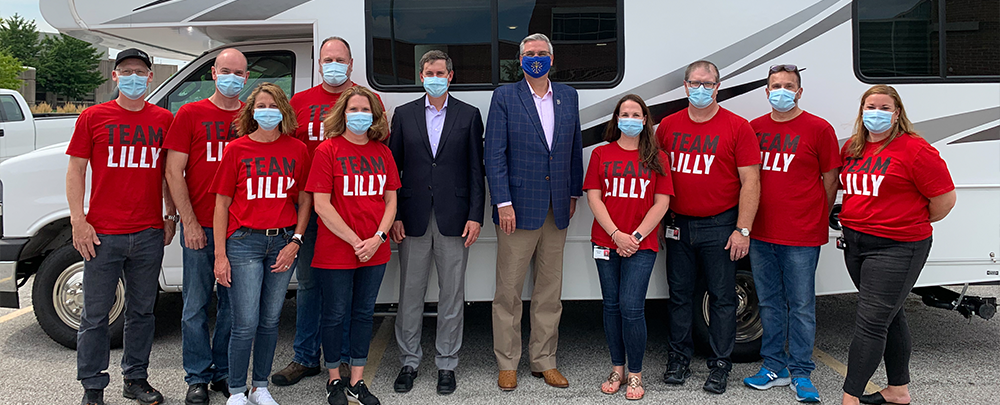21 Jan. 2021. A clinical trial shows long-term care residents and staff receiving a synthetic antibody treatment have a lower risk of getting symptomatic Covid-19 infections. Early results of the trial were announced today by drug maker Eli Lilly and Co., in Indianapolis, developer of the synthetic monoclonal antibody treatment bamlanivimab with biotechnology company AbCellera Biologics Inc. in Vancouver, British Columbia.
Bamlanivimab was initially developed by AbCellera as an immunoglobulin G antibody designed to block the SARS-CoV-2 spike protein that penetrates and infects cells. AbCellera says it screened more than 5 million immune-system cells against a blood sample from one of the first people in the U.S. infected with the novel coronavirus, as it was called at the time.
From this screening, AbCellera says it identified some 500 unique human antibody sequences that respond to the SARS-CoV-2 virus responsible for Covid-19 infections. Eli Lilly, which licensed the antibody in March 2020, and AbCellera partnered with the Vaccine Research Center at National Institute of of Allergy and Infectious Diseases, or NIAID, part of National Institutes of Health, to identify the best-performing candidates.
AbCellera Biologics first developed bamlanivimab as a therapy for individuals with Covid-19 infections, which the Food and Drug Administration authorized for emergency use in November 2020. That authorization covers only out-patients testing positive for the SARS-CoV-2 virus with mild to moderate Covid-19 symptoms, but at high risk of more serious infections. For treating patients hospitalized with more serious infections, however, bamlanivimab has less success, with a trial of the drug stopped when results showed little clinical value for these patients.
Eli Lilly, Abcellera, and NIAID are also testing bamlanivimab as a way to prevent serious Covid-19 infections among long-term care residents and staff, individuals at high risk of contracting the disease. The late-stage clinical trial is enrolling 5,000 assisted living and nursing home residents and staff, to test bamlanivimab alone and in combination with another antibody against a placebo as a preventive step against Covid-19 infections. The study team is looking primarily for patients contracting Covid-19 infections, particularly with moderate or more severe symptoms, as well as rates of adverse effects, including hospitalizations and deaths.
Residents and staff, infected and not infected
Eli Lilly and Abcellera are reporting early trial results directly, not peer reviewed, from participants receiving a 4,200 milligram dose of bamlanivimab or a placebo. The findings cover 965 participants, 299 residents and 666 staff testing negative at the start of the trial, and 132 participants, 41 residents and 91 staff, already infected with Covid-19.
Results show, among all participants after eight weeks, lower rates of symptomatic Covid-19 infections for bamlanivimab recipients compared to placebo recipients, reducing the risk of symptomatic infection by 57 percent. Among long-term care residents alone after eight weeks, the risk of becoming infected and showing Covid-19 symptoms is reduced by 80 percent among bamlanivimab recipients compared to placebo recipients.
The companies say rates of serious adverse effects were similar among bamlanivimab and placebo recipients, and consistent with earlier trials. Four deaths among these trial participants all occurred with placebo recipients.
As reported by Science & Enterprise in August 2020, Eli Lilly is taking extra steps to reach long-term care facilities for this and earlier trials, converting recreational vehicles into mobile research labs. The custom-modified mobile units, as shown above, serve as infusion clinics for clinical trial participants, as well as self-contained materials storage and preparation labs.
More from Science & Enterprise:
- US Govt to Buy 1.25M Regeneron Covid-19 Therapies
- Large Trial Testing Covid-19 Antibody Therapies
- AbbVie Acquires Coronavirus Antibody Therapy
- Covid-19 Antibody Developer Raises $483M in IPO
- Univ, Industry Labs Study Inhaled Covid-19 Antibodies
* * *


 RSS - Posts
RSS - Posts
You must be logged in to post a comment.